
Time is one of the few resources that is truly finite. Once it’s gone, it’s gone forever. Yet, many people struggle to manage their time effectively, often feeling overwhelmed, stressed, and unproductive. Whether you’re juggling a busy career, personal commitments, or pursuing your goals, mastering time management is crucial to achieving both personal and professional success. In this blog, we’ll explore the principles of time management, strategies for improving productivity, and practical tips to help you take control of your time and live a more balanced life.
What is Time Management?

At its core, time management is the process of planning and controlling how much time to spend on specific activities. The goal of time management is not just to increase productivity, but to ensure you’re using your time effectively, achieving your goals, and maintaining a sense of well-being and balance. Poor time management leads to stress, missed deadlines, and feelings of being overwhelmed, while good time management creates space for both professional success and personal satisfaction.
The Importance of Time Management
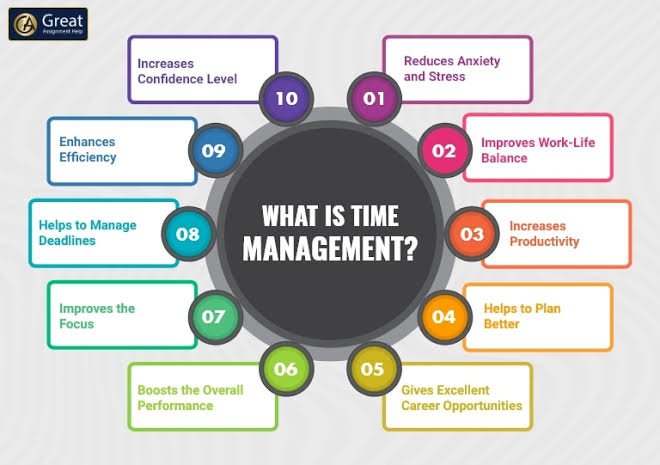
- Increased Productivity: Effective time management allows you to focus on what’s important, minimize distractions, and work more efficiently, leading to higher productivity.
- Reduced Stress: By planning your tasks and breaking them down into manageable steps, you can avoid the panic of last-minute deadlines and reduce feelings of stress and anxiety.
- Better Decision-Making: When you manage your time well, you can dedicate more mental resources to making thoughtful, strategic decisions rather than rushing or reacting impulsively.
- Improved Quality of Work: Time management gives you the ability to allocate enough time to each task, leading to better attention to detail and higher quality output.
- Work-Life Balance: Proper time management helps you create boundaries between work and personal life, allowing you to nurture relationships, pursue hobbies, and take care of your mental and physical well-being.
Common Time Management Challenges
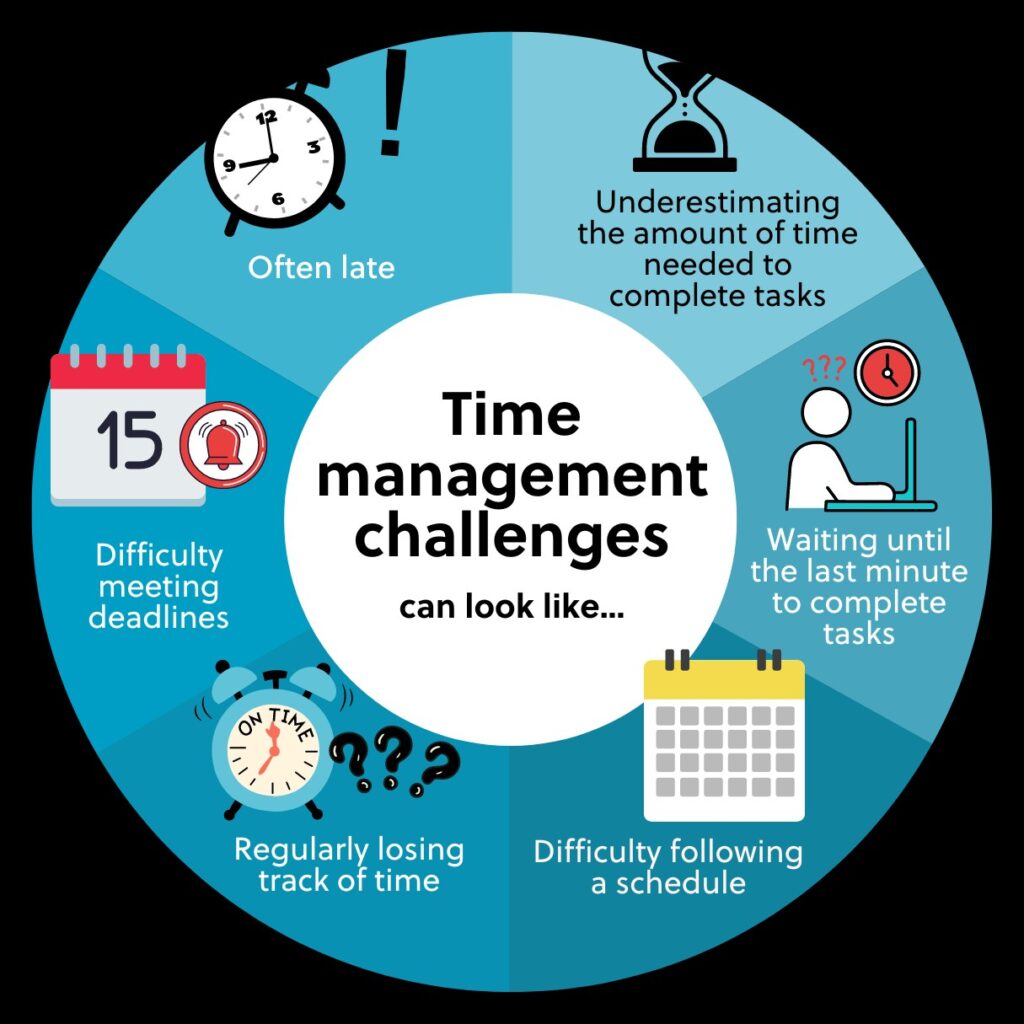
Before diving into the strategies for better time management, it’s important to acknowledge some of the most common obstacles people face:
- Procrastination: The tendency to delay or avoid tasks is a major barrier to time management. Procrastination often stems from fear of failure, lack of motivation, or perfectionism.
- Distractions: Whether it’s social media, emails, or people interrupting you, distractions are one of the biggest time stealers in today’s fast-paced world.
- Overcommitment: Many people struggle to say “no” to requests, leading to overloaded schedules and a lack of time for their most important priorities.
- Lack of Prioritization: Without a clear sense of priorities, it’s easy to get lost in a sea of tasks that aren’t aligned with your long-term goals.
- Poor Planning: A lack of structure or clear plans can lead to inefficient use of time. Without a roadmap, it’s easy to drift aimlessly from task to task without achieving meaningful results.
Strategies for Effective Time Management
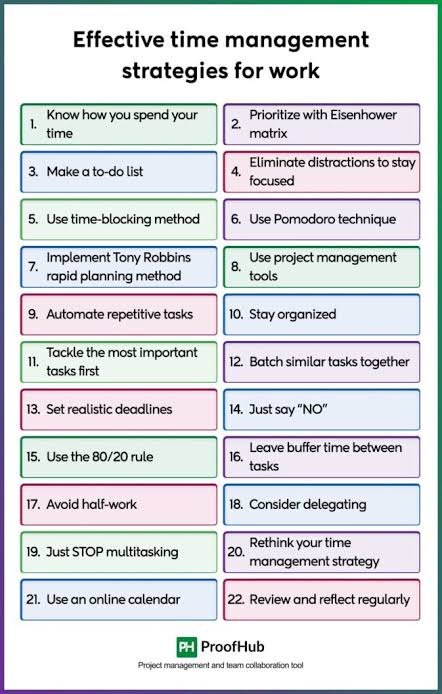
Now that we’ve identified the importance of time management and common challenges, let’s explore proven strategies that can help you take control of your time.
1. Set Clear Goals
Effective time management begins with a clear understanding of what you want to achieve. Setting goals gives you direction and purpose, allowing you to focus your energy on tasks that move you toward your objectives.
- SMART Goals: One effective framework for goal-setting is the SMART system, which encourages goals that are:
- Specific: Clearly define what you want to achieve.
- Measurable: Ensure there’s a way to track progress.
- Achievable: Set realistic goals that are within your control.
- Relevant: Align your goals with your values and long-term objectives.
- Time-bound: Set deadlines for achieving each goal.
2. Prioritize Tasks
Not all tasks are created equal. To make the most of your time, it’s crucial to prioritize tasks based on their importance and urgency. One effective method is the Eisenhower Matrix, which categorizes tasks into four quadrants:
- Urgent and Important: These tasks should be your top priority (e.g., deadlines, crises).
- Important, but Not Urgent: Focus on these tasks to avoid future stress (e.g., long-term projects, relationship-building activities).
- Urgent, but Not Important: These tasks can often be delegated to others (e.g., phone calls, meetings).
- Neither Urgent nor Important: These tasks are time-wasters and should be minimized or eliminated (e.g., excessive social media, unnecessary meetings).
By focusing on tasks that truly align with your goals, you can prevent yourself from getting caught up in low-value activities.
3. Time Blocking
Time blocking is a strategy that involves scheduling specific blocks of time for focused work on particular tasks or activities. Rather than multitasking or letting tasks spill over into each other, you set aside dedicated time for each item on your to-do list.
For example, you might block out the first two hours of your day for deep work on an important project, followed by a block of time for meetings, then another block for responding to emails or handling administrative tasks. This approach helps you stay organized, focused, and avoids the stress of switching between different types of work.
4. Use a Calendar or Planner
One of the simplest yet most effective tools for managing your time is a calendar or planner. Whether you prefer a digital calendar (Google Calendar, Outlook) or a paper planner, having a visual representation of your schedule helps you see how your time is allocated and prevents overbooking yourself.
- Schedule “buffer time”: Be sure to include some extra time between meetings or tasks to account for delays, unexpected interruptions, or brief breaks to recharge.
- Set reminders: Use alarms or notifications to remind you of deadlines or important events. This reduces the mental load of remembering everything.
5. Break Tasks Into Smaller Steps
Large, overwhelming tasks can often lead to procrastination. One way to make them more manageable is by breaking them down into smaller, actionable steps. For example, if you’re working on a big report, break the process down into research, outlining, writing, and editing.
By focusing on smaller chunks of work, you not only make the task less daunting but also make steady progress that builds momentum.
6. Eliminate Distractions
Distractions are one of the biggest time killers. To boost your focus and productivity, it’s essential to identify and eliminate distractions. Here are some strategies:
- Turn off notifications: Whether it’s on your phone or computer, turning off non-essential notifications helps you stay focused on the task at hand.
- Create a distraction-free workspace: Designate a space for focused work that minimizes interruptions. If working from home, set boundaries with family or roommates.
- Use productivity apps: Apps like Forest, Focus@Will, or StayFocusd can help you stay off distracting websites or apps and maintain concentration.
7. Delegate and Outsource
You don’t have to do everything yourself. Delegating tasks that don’t require your unique expertise or can be handled by others is a smart way to free up time for higher-priority work.
- At work: Delegate routine tasks to team members or outsource to a virtual assistant.
- At home: Consider outsourcing tasks like cleaning, grocery shopping, or yard work if they are taking up valuable time.
Delegation allows you to focus on what matters most and ensures that tasks are still getting done without you having to do everything.
8. Learn to Say No
A major obstacle to effective time management is overcommitment. Many people struggle to say “no” to requests, leading to overloaded schedules and burnout.
- Set boundaries: If someone asks you to take on a new task, evaluate if it aligns with your current priorities. If it doesn’t, be prepared to politely decline.
- Be assertive, not apologetic: It’s important to recognize that saying no is not selfish—it’s necessary for preserving your time and energy.
9. Review and Reflect Regularly
Effective time management is an ongoing process. To improve, it’s essential to regularly assess how you’re spending your time and whether your strategies are working.
- Track your time: Keep a time log for a week to see where your time is going. This can reveal areas where you may be wasting time or not focusing on the right tasks.
- Reflect on your goals: Are you making progress toward your goals? If not, adjust your approach to better align with your priorities.
10. Take Care of Yourself
Good time management isn’t just about working harder—it’s also about maintaining your health and well-being. When you take care of yourself, you’ll be more focused, energized, and productive.
- Get enough sleep: Sleep is crucial for mental clarity and focus.
- Exercise regularly: Physical activity boosts energy levels and reduces stress.
- Practice mindfulness: Taking time to meditate or engage in mindful practices can help reduce mental clutter and improve focus.
Tips for Time Management
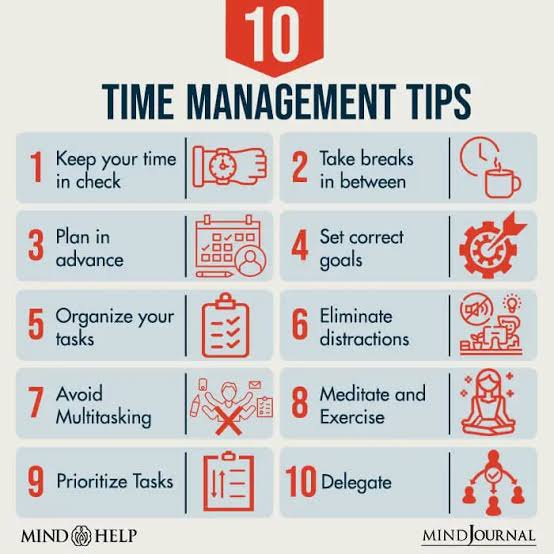
Time management is essential for staying productive and reducing stress. Here are some practical tips to help you manage your time more effectively:
1. Prioritize Your Tasks
- Use the Eisenhower Matrix: Divide tasks into four categories:
- Urgent and important: Do these immediately.
- Important but not urgent: Schedule these for later.
- Urgent but not important: Delegate if possible.
- Not urgent and not important: Eliminate or minimize these.
- The 80/20 Rule (Pareto Principle): Focus on the 20% of tasks that will yield 80% of the results.
2. Time Blocking
- Block off time for specific tasks: Dedicate chunks of your day to specific activities, whether it’s work, exercise, or leisure.
- Avoid multitasking: Focus on one task during each block to improve productivity and reduce errors.
3. Set SMART Goals
- Specific, Measurable, Achievable, Relevant, Time-bound goals help keep you on track and ensure you’re focused on the right priorities.
4. Use a Planner or Digital Tools
- Physical planner or apps (like Todoist, Notion, or Google Calendar): Keep all tasks, meetings, and deadlines in one place.
- Set reminders and alerts: These can prevent things from slipping through the cracks.
5. The Pomodoro Technique
- Work in 25-minute intervals followed by a 5-minute break. After 4 intervals, take a longer break (15-30 minutes).
- This method helps maintain focus and prevents burnout.
6. Avoid Procrastination
- Break tasks into smaller steps: Large tasks can feel overwhelming, so break them down into manageable parts.
- Use the 2-Minute Rule: If a task will take 2 minutes or less to complete, do it immediately.
- Commit to just 5 minutes: If you’re procrastinating, commit to working on a task for just 5 minutes. Often, starting is the hardest part.
7. Learn to Say No
- Respect your own time and don’t overcommit. It’s okay to turn down tasks or meetings that don’t align with your priorities.
8. Delegate or Outsource Tasks
- If possible, delegate tasks that others can do, especially if they’re not a good use of your time.
- Consider outsourcing tasks like grocery shopping, admin work, or cleaning if they’re time-consuming.
9. Limit Distractions
- Identify distractions (social media, phone calls, etc.) and limit them during focused work periods.
- Consider using tools like Focus@Will (for concentration-enhancing music) or Forest (which encourages staying off your phone).
10. Reflect and Review Regularly
- At the end of each day or week, reflect on what you accomplished and adjust your priorities for the next day or week.
- Regular review helps you stay on track and avoid getting stuck in unproductive habits.
11. Take Care of Your Well-being
- Ensure you get enough sleep, exercise, and breaks throughout the day. A tired mind or body will be less productive.
- Balance work with leisure to avoid burnout.
Bonus Tip:
Batch Similar Tasks: Group similar tasks together (like answering emails or making phone calls) to stay focused and complete them more efficiently.
By using some or all of these strategies, you can create a routine that works for you and boosts both productivity and well-being.
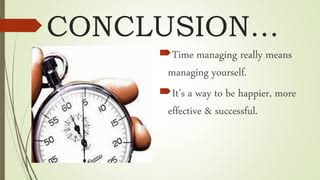
Conclusion
Time management is an essential skill for achieving personal and professional success. By setting clear goals, prioritizing tasks, eliminating distractions, and regularly assessing your progress, you can make the most of your time and create a more balanced, productive life. It’s important to remember that time management is a journey, not a destination, and that it requires ongoing effort and adjustment. With the right mindset and tools, you can take control of your time and achieve your full potential.
